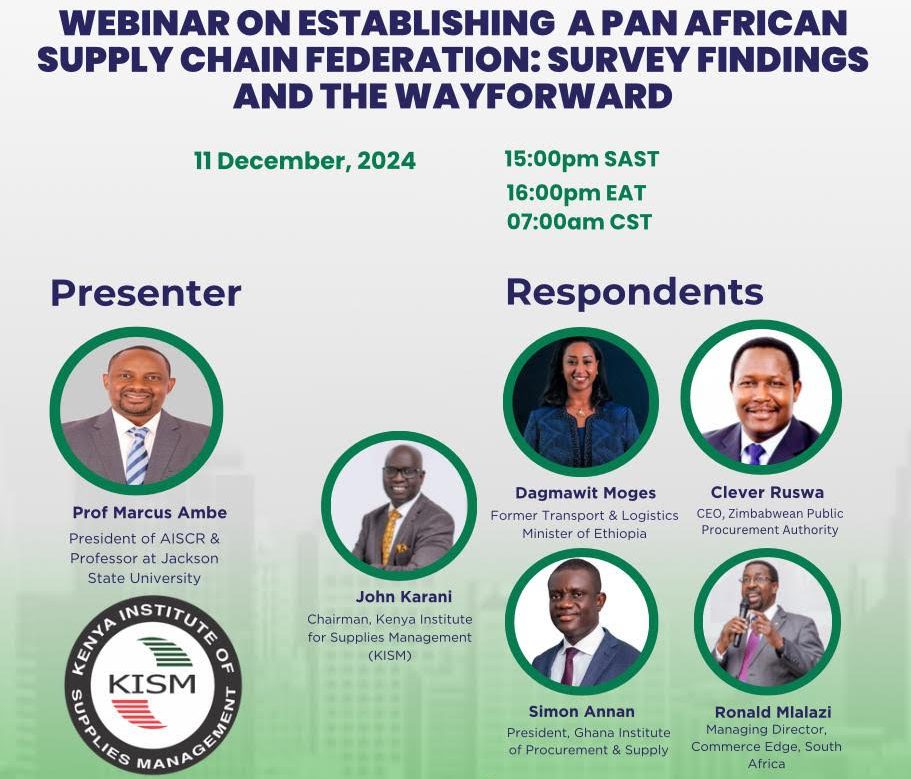Navigating Trump's Second Term: The Future of U.S.-Africa Trade and Supply Chains January 24, 2025…

Webinar Report on Africa’s Supply Chain Revolution: Establishment of a Continental Federation
Webinar Report on Africa’s Supply Chain Revolution: Establishment of a Continental Federation
Marcus Ambe, President of AISCR & Professor at Jackson State University
Introduction
The webinar focused on the creation of a Pan-African Supply Chain Management Federation, following a resolution adopted during the 1st AISCR Pan-African Supply Chain Management Conference held in Nairobi, Kenya. The initiative seeks to professionalize supply chain practices across Africa, aligning with the Africa Agenda 2063 and the United Nations Sustainable Development Goals (SDGs). With participation from professionals, academics, and policymakers, the webinar explored strategies for addressing logistical challenges, regulatory disparities, and workforce development gaps to elevate supply chain standards on the continent. Moderated by Prof. Marcus Ambe, the session featured notable speakers, including John Karani, Clever Russia, and Ronald MLalalazi. Key themes included professionalizing supply chain practices, financing mechanisms, and workforce development, with a focus on collaboration and standardization across African nations. The Federation is envisioned as a driver of economic growth, aligned with Africa Agenda 2063 and the SDGs.
Highlights of the Webinar
Purpose and Objectives
The primary objective of the webinar was to discuss the establishment of a Federation that would unify Africa’s supply chain management under standardized practices and ethical guidelines. Key themes included fostering professional development, integrating SMEs, and creating a Pan-African certification framework to enhance supply chain efficiency and resilience.
Participants and Speakers
- Prof. Marcus Ambe (Moderator): Set the context by emphasizing the need for collaboration to address Africa’s supply chain challenges.
- John Karani (Chairman, Kenya Institute of Supplies Management): Discussed Kenya’s regulatory model as a template for other African nations.
- Hon. Dagmawit Moges, Former Transport and Logistics Minister of Ethiopia: Focused on financing mechanisms to support the Federation.
- Ronald MLalalazi (Managing Director, Commerce Edge): Highlighted the importance of workforce development.
- Simon Anan (President, Ghana Institute of Procurement and Supply): Outlined a roadmap for the Federation’s implementation.
Key Presentations and Discussions
The discussions highlighted critical next steps, such as forming a working group to engage stakeholders, aligning local regulations with ASCA standards, and establishing ethical guidelines. Speakers stressed the importance of integrating educational curricula, including SMEs, and creating a Pan-African certification framework. Financing strategies like public-private partnerships and leveraging trade agreements were also discussed. Key deliverables include drafting a roadmap, securing sustainable funding, and promoting professional networking and continuous development.
- Professionalization and Certification
- John Karani outlined the evolution of Kenya’s supply chain governance, emphasizing the success of local certification bodies like the Kenyan Institute of Supplies Management (KISM).
- He advocated for a Pan-African certification framework to standardize skills, attract young talent, and enhance professional credibility.
- Financing Mechanisms
- Dagmawit Moges presented on funding strategies, including public-private partnerships, regional cooperation, and leveraging multilateral trade agreements.
- She underscored the importance of aligning the Federation’s goals with global initiatives to attract financial support from international donors and development banks.
- Workforce Development
- Ronald MLalalazi proposed a standardized competency framework to ensure consistent training across African nations.
- He emphasized collaboration with educational institutions to integrate supply chain management into curricula and create career pathways for young professionals.
- Roadmap for Implementation
- Simon Anan highlighted stakeholder engagement as critical to building the Federation’s credibility.
- He called for forming partnerships with government agencies, professional institutions, and SMEs to create a sustainable and inclusive Federation.
Key Challenges and Proposed Solutions
- Regulatory Disparities
- Challenge: Inconsistent regulations across African nations hinder collaboration.
- Solution: Align local regulations with ASCA standards and advocate for policy reforms that recognize supply chain management as a profession.
- Ethical Standards and Professional Conduct
- Challenge: Corruption and lack of ethical practices damage the profession’s reputation.
- Solution: Establish a robust code of ethics and tangible membership benefits to attract professionals and ensure accountability.
- SME Inclusion
- Challenge: SMEs often lack the resources and expertise to compete in supply chain management.
- Solution: Develop intentional strategies to support SMEs, such as capacity-building programs and preferential policies.
- Sustainable Funding
- Challenge: Dependency on voluntary efforts limits the Federation’s growth.
- Solution: Create a sustainable funding model, leveraging membership fees, sponsorships, and grant opportunities.
Next Steps
- Formation of a Working Group
- Establish a committee to engage stakeholders, including government agencies, private sector representatives, and educational institutions.
- Development of Strategic Plans
- Draft a five-year plan outlining objectives, key deliverables, and funding strategies.
- Stakeholder Engagement
- Conduct consultations to ensure the Federation meets the diverse needs of the public sector, private sector, NGOs, and SMEs.
- Standardization and Certification
- Operationalize a Pan-African certification framework, with Kenya’s successful model as a blueprint.
Conclusion
The webinar highlighted the urgent need for a unified Pan-African Supply Chain Federation to address systemic challenges and harness opportunities for economic growth. By aligning with Africa Agenda 2063 and the SDGs, the Federation has the potential to transform supply chain management into a cornerstone of Africa’s development. With collaboration, innovation, and ethical practices, the Federation will drive progress, professionalize the sector, and create a sustainable future for African supply chains.



